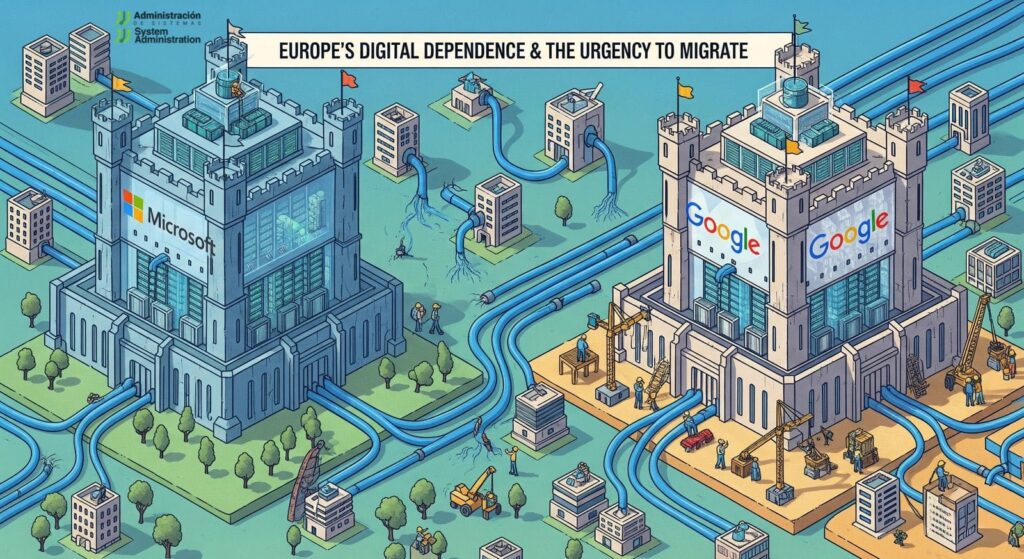The European Union (EU) has long declared its intention to achieve digital sovereignty, but reality points in the opposite direction. Today, public administrations, universities, businesses, and citizens rely excessively on foreign technology solutions, mainly from the United States. Microsoft Office, Windows, and cloud email services from Google and Microsoft have become the pillars of daily life, creating a structural dependency that limits Europe’s political, economic, and technological autonomy.
Meanwhile, isolated initiatives in some countries to replace Windows with Linux show that change is possible, but not coordinated. What Europe truly needs is to think bigger: a unified plan that covers not only operating systems but also office suites, email, and cloud services, with a decisive bet on opensource and European-driven solutions.
The Microsoft Office trap: more than a word processor
Microsoft Office is not just a productivity suite. It has become the de facto standard for administration and business, forcing citizens and organizations to depend on proprietary formats and pay recurring license fees.
Alternatives such as LibreOffice exist, but lack of political will and institutional inertia have prevented their large-scale adoption. At the same time, the ever-closer integration of Office with cloud services like OneDrive and Outlook 365 reinforces a vendor lock-in model, making it extremely difficult to escape Microsoft’s ecosystem.
The dependence is so deep that even in European educational institutions—where open standards should be prioritized—Office 365 dominates, perpetuating a culture of technological dependence from the earliest stages of training.
Email: trapped between Google and Microsoft
The situation is no better in the world of corporate and educational email. The vast majority of European universities, research centers, and administrations depend on Google Workspace or Microsoft Exchange Online.
This centralization raises two critical problems:
- Privacy and data sovereignty: sensitive correspondence from governments, institutions, and citizens is stored on servers controlled by U.S. companies, subject to the Cloud Act.
- Monopoly risks: concentration in just two providers reduces competition, increases long-term costs, and stifles local innovation.
In contrast, free software-based email solutions such as Postfix, Dovecot, or Roundcube allow Europe to build its own infrastructures. But this requires political commitment and sustained investment, instead of outsourcing everything to third-party clouds.
SUSE, openSUSE, and Debian: pillars of digital sovereignty
In the operating system arena, SUSE, headquartered in Germany, stands out as a paradigm. SUSE Linux Enterprise is one of the few enterprise-grade solutions with European roots that can compete with Red Hat (IBM) and Microsoft in the corporate and government space.
Alongside SUSE, the community-driven openSUSE project provides a robust, free distribution for servers and desktops alike. Betting on SUSE and openSUSE would not only mean adopting Linux, but also strengthening a European-based company and a global community project where Europe could play a central role.
However, sovereignty should not depend entirely on corporations, even European ones. This is where Debian, a purely community-driven distribution maintained by volunteers worldwide, becomes a strategic option: Linux without corporate dependence, guaranteeing long-term independence.
If Europe were serious about digital sovereignty, a combined ecosystem of commercial European solutions (SUSE/openSUSE) and community-based projects (Debian, LibreOffice, Nextcloud, etc.) would be the most effective formula.
The inevitable (and necessary) sacrifices
Moving from Microsoft Office to LibreOffice, from Exchange to free email solutions, or from Windows to Linux is not without challenges:
- Access to certain proprietary applications (Adobe Creative Cloud, AutoCAD, etc.) would be lost.
- Compatibility with Microsoft’s closed formats remains a stumbling block in mixed environments.
- The gaming ecosystem, still dominated by Windows, would take a hit, despite progress with Proton and Steam on Linux.
Yet, short-term sacrifices must be seen as long-term strategic investments. If the EU’s 450 million citizens migrate in a coordinated fashion, the market itself will pressure global companies to adapt their applications and games to Linux and open standards.
Europe versus the U.S. and China
While Europe debates, the United States protects Intel and General Motors, and China safeguards Huawei and Lenovo. The message is clear: major powers do not let their tech champions collapse.
Europe, however, remains stuck in a free-trade orthodoxy that has allowed historic European brands like Volvo or MediaMarkt to end up in foreign hands. Digital sovereignty is not just about software—it’s about geopolitical power and industrial survival.
Conclusion: from speeches to action
Europe already has the foundations: SUSE, openSUSE, Debian, LibreOffice, Nextcloud. What is missing is strategic vision and political will.
If the EU wants to avoid becoming merely a consumer market managed by U.S. and Chinese tech giants, it must act decisively:
- Migrate from Windows to Linux, with SUSE and openSUSE as the enterprise backbone and Debian as the community core.
- Replace Microsoft Office with LibreOffice, enforcing open standards across administration, education, and business.
- Move away from Gmail and Exchange toward free software-based email solutions deployed on infrastructures under European control.
Digital sovereignty is not achieved with speeches, but with hard decisions. And the time to take them is now—before the technological gap with the United States and China becomes an unbridgeable abyss.

